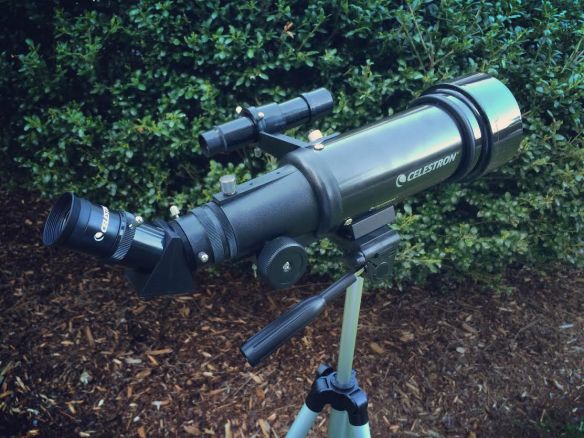The sky’s clear tonight, so I was just out looking through the telescope again. The past couple of nights were rainy and cloudy, so that was a bust, but it’s perfect this evening.
I like being outside after dark. It kind of feels like you’ve got the whole world to yourself. The lights are out and everyone’s gone to bed. It’s pleasantly quiet. All I can hear is the sloshing of the creek, crickets chirping and the whistle of a distant train.
With my left eye squinted shut and my right peering through the eyepiece, I set my gaze upon Arcturus, a red giant star about 26 times larger than the Sun, and approximately 37 light years away.
That got me to thinking about a conversation I had last night with some friends as we stuffed ourselves with burritos. We wondered how long it would take to drive to the Sun. We didn’t get far into the discussion before getting sidetracked, but we were on the topic long enough for me to do the math on my phone that told us it would be the equivalent of 3,720 trips around the Earth, assuming you were driving around the equator (and could drive on water, teehee).
So tonight, I started wondering more specifically about how far that really is.
To start out, the Sun is 93,000,000 miles away. Light, the fastest thing in existence (that we know of) takes approximately seven minutes to reach us from the Sun.
Of course, we’re talking about driving our car to the Sun (let’s just pretend that’s possible), so we won’t be traveling anywhere near that fast. For the sake of familiarity, I’m going to say we’re driving 60 MPH, just like you would on the interstate. That’s the speed limit in space, so don’t let the galactic fuzz catch you speeding.
So we’re planning our trip. We’re talking about going 93 million miles at 60 miles per hour. That means it’ll take us about 1,550,000 hours of non-stop driving to get there (sorry, no potty breaks). To break that down further, that’s about 65,000 days. Or, if my math is right, roughly 177 years.
That’s how long it would take us to drive from the Earth to the Sun. One hundred and seventy seven years. Better stock up on the snacks for that trip.
We get so caught up in talking about other stars, planets and galaxies, we start to lose perspective. The Universe is so vast that our brains can’t comprehend it. And there are stars that make ours look small by comparison. But it’s not small at all! Our own galaxy, the Milky Way, is 100,000 light years across. That’s huge! But even our own solar system is MASSIVE.
So sit on that for a little bit. It would take us 177 years to drive to the Sun, but it only takes light seven minutes to make that trip. If it takes light 100,000 years to travel across the Milky Way, then I can’t even fathom how long of a car ride that would be. (Actually, I did that math, too, and it would take 11,415,525 years. Better use the bathroom before we leave, LOOOOOOL!)
It’s just bonkers, man. And it’s pretty humbling.

